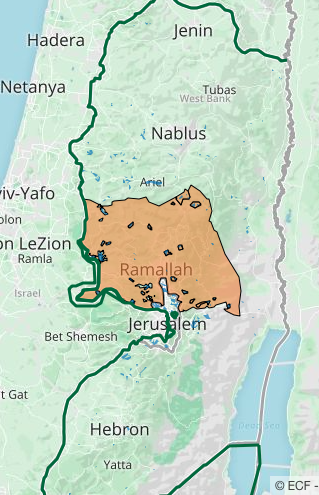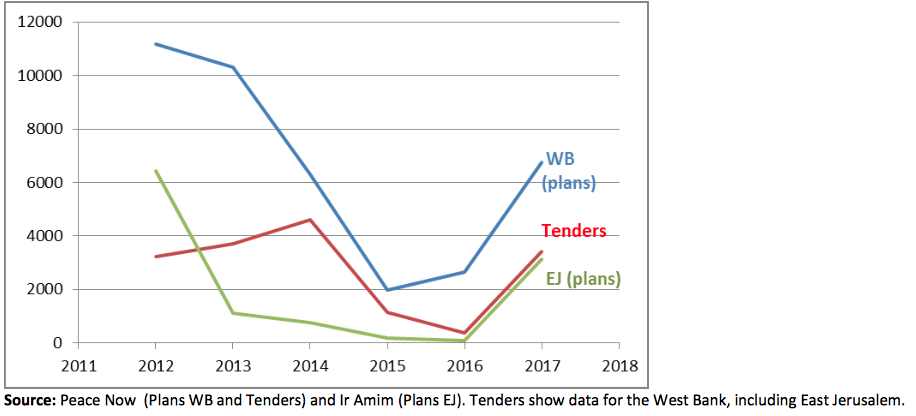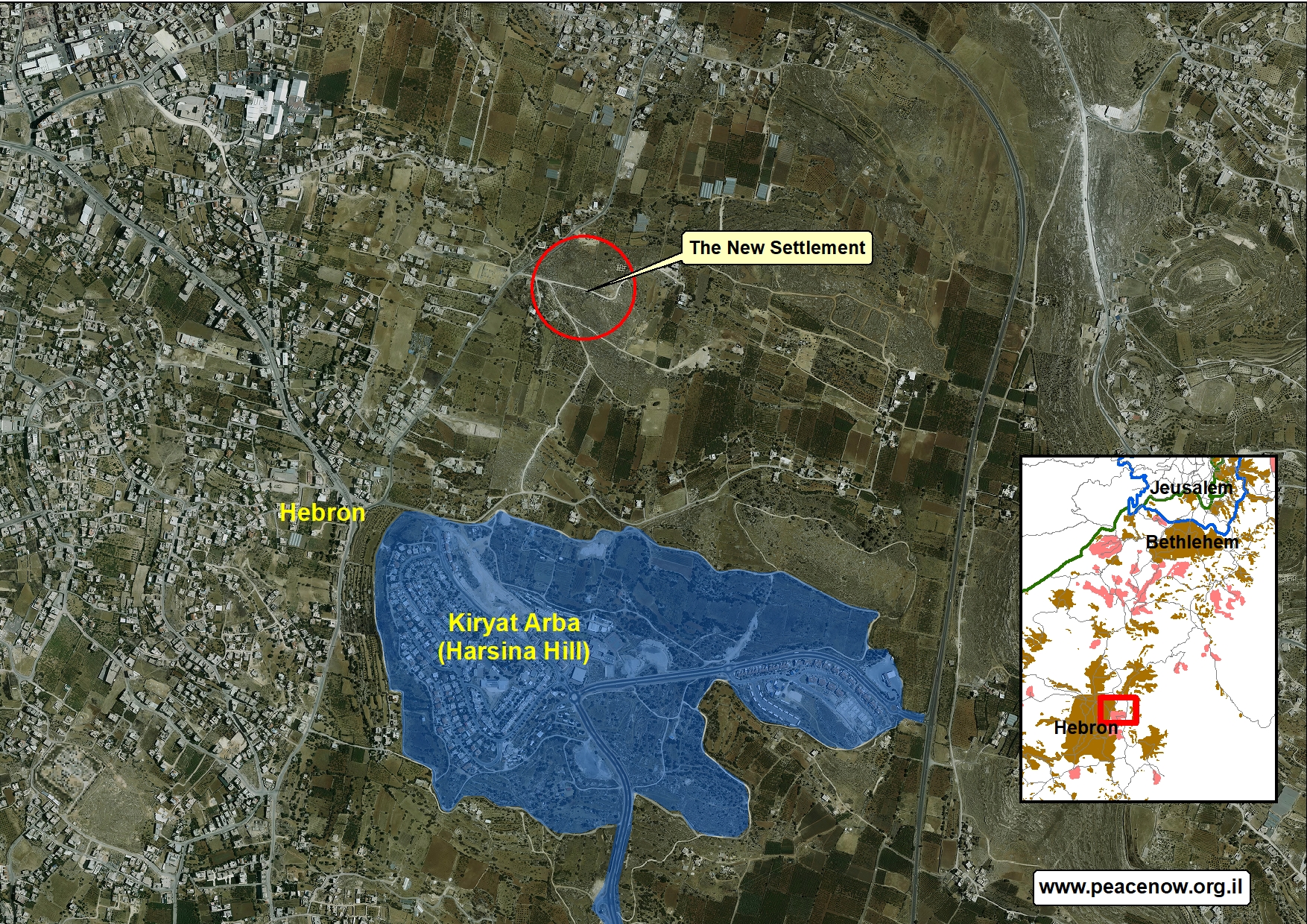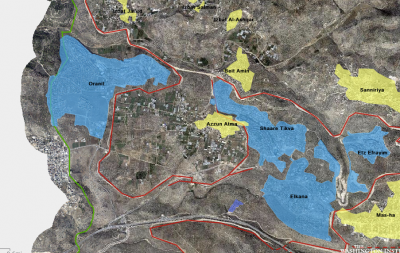Welcome to FMEP’s Weekly Settlement Report, covering everything you need to know about Israeli settlement activity this week.
To receive this report via email, please click here.
March 9, 2018
- New Settlement in Hebron
- Palestinians Protest Rumored Plan to Unite & Expand Settlements Near Qalqilya
- High Court Reviewing Government Practice of Paying Off Settler Law-breakers
- Israel’s New West Bank Commander Promises to Defend the Settlements
- Documents Reveal: Government Funds Are Going to Unauthorized Outposts
- Israel Admits Theft of Spring was Carried out Illegally, Promises Court to Steal it Properly
- EU Report Shows Major Acceleration in Settlement Planning
- Settlement-Related AIPAC Conference Happenings
- Bonus Reads
Comments, questions, or suggestions? Email Kristin McCarthy at kmccarthy@fmep.org.
New Settlement in Hebron
Signaling the start of construction on what is effectively a new settlement in Hebron, settlers have moved four caravans onto a site located around a kilometer from the border fence of the radical Kiryat Arba settlement, on a site designated to become a new industrial zone for the settlement. The Civil Administration (a branch of the Israeli Army which is the sovereign ruling power in the occupied West Bank), told the press that the new industrial zone is being built on land seized decades ago by Israel as “state land,” according to a plan approved in “accordance with procedures.”
The anti-settlement watchdog organization Peace Now disputes the Civil Administration assessment of the project. Peace Now notes that the project takes advantage of a plan for the Kiryat Arba settlement that was approved 30 years ago (in 1988), but never executed — and that present day realities are much different than they were 30 years ago. Peace Now notes, too, that the project is located well outside of the developed lines of the settlement and beyond the fence that surrounds it – making it, in effect, a new Israeli settlement in Hebron.
Peace Now said:
“This is Prime Minister Netanyahu’s gift to U.S. President Trump on the day of their meeting. For years, Israeli governments have refrained from establishing new settlements, especially in as sensitive a place as Hebron, but in recent months the Netanyahu government has permitted settlement activity without restraint and has taken steps that undermine the chances of a two-state solution. The new settlement near Hebron is liable to cause significant harm to the lives of dozens of Palestinian families who live nearby who are expected to suffer new security arrangements that will restrict their freedom of movement and harm the daily fabric of their lives.”
OCHA recently published a timely new report titled, “The Humanitarian Impact of Israeli Settlements in Hebron City.” The Kiryat Arba settlers and their security arrangements in the city are important contributing factors to the combined humanitarian toll settlements take on Palestinian residents of Hebron, whose entire lives – including freedom of movement, ability to engage in commerce, and access to education – are acutely strangled by the presence of Israeli settlers.
Palestinians Protest Rumored Plan to Unite & Expand Settlements Near Qalqilya
Since FMEP’s initial report on February 2018, scant further details have emerged regarding Israel’s rumored plan to unite four settlements near Qalqilya into a super settlement, thereby significantly expanding the collective footprint and population of those settlements. Nonetheless, Palestinian fears are growing about the plan’s implementation, which the governor of Qalqilya Rafi Rawajba recently called “state terror.”
Qalqilya residents have long held weekly protests against Israeli settlement expansion and the separation wall (while in some areas the separation barrier is composed of fencing, the city of Qalqilya is surrounded on all sides by a high cement wall, with only a narrow opening left for access into the rest of the West Bank). This past week, the Israeli army violently dispersed the protests, reportedly using rubber coated bullets, tear gas, and stun grenades.
The plan to unite and expand Qalqilya-area settlements should be understood alongside the July 2017 political battle that ultimately killed the implementation of a plan to build new homes and infrastructure for Palestinians in Qalqilya, which in addition to being surrounded by the Israeli separation wall is also the West Bank’s most densely populated city. The plan – which was formulated and defended by Israeli Defense Minister Avigdor Liberman, would have granted Israeli permission to the Palestinian Authority to double the size of Qalqilya by building on land in Area C (the 60% of the West Bank where the Palestinian Authority is not allowed to operate).
High Court Reviewing Government Practice of Paying Off Settler Law-breakers
The High Court of Justice temporarily blocked the Israeli government from offering monetary compensation to residents of illegal settlement outposts whose homes are demolished by the government of Israel. Such homes were built illegally according to Israeli law, and oftentimes on privately owned Palestinian land. The ruling ordered the government to submit a defense of the practice by March 12th.
The High Court’s ruling is in response to a petition filed by Israeli lawyer Shachar Ben Meir that specifically challenges the legality of Israel’s decisions to pay-off settlers evicted from the outposts of Amona and Ofra, as well as a recently approved pay-off for Netiv Ha’avot outpost settlers. None of those pay-offs have actually been transferred to date, and the ruling this week freezes the government’s ability to do so.
Ben Meir told the Times of Israel:
“The state cannot compensate building offenders for their homes being demolished when they built without a permit on land that wasn’t theirs. And if it decides to do so, it must be according to rules that are equal to everyone.”
It is worth noting that when it comes to “illegal” Palestinian construction in East Jerusalem – that is, construction on land owned by Palestinians but for which Israel has not (and generally will not) approve plans for building — Israel not only doesn’t compensate them financially for their loss, but it charges them for the cost of the demolition unless they demolish their own home first (called a self-demolition).
Israel’s New West Bank Commander Promises to Defend the Settlements
In a transfer of power ceremony this week, Major General Nadav Padan was sworn in as the new head of the Israeli Defense Force Central Command, becoming the highest ranking Israeli official in charge of all Israeli affairs in the West Bank. In his speech, Padan committed to “enabling a [high] quality of life for both Israelis and Palestinians while maintaining the rule of law and the spirit of the IDF.”
The outgoing commander also gave a speech at the ceremony, in which he embraced and praised the the settler population as a whole, while admonishing settlers leaders, saying:
“Regrettably, there is still a small handful of settlers challenging authorities as well as law and order. I urge you to continue to act and denounce this group”
Maj. Gen. Padan takes over the West Bank after serving previously as, among other things, the top general leading Israel’s incursion into Gaza during the summer of 2014, known in Israel as “Operation Protective Edge.” That assault lasted 50 days, during which Israel lost 66 soldiers and four civilians, while according to the United Nations, 2,131 Palestinians were killed, of which 1,473 were civilians, 501 were children, and 257 were women.
Documents Reveal: Government Funds Are Going to Unauthorized Outposts

Map by the Economic Cooperation Foundation (ECF)
In response to a freedom of information request filed by Peace Now, the Israeli government released a trove of documents revealing that the Binyamin Regional Council – which receives government funding – has been funding infrastructure in far-flung outposts built without authorization and therefore considered illegal according to Israeli law (all settlement activity – whether or not it is permissible under Israeli law – is illegal under international law). The Binyamin Regional Council is the largest settler regional council and acts as a governing body officially representing 42 settlements (and unofficially many illegal outposts), covering a large area starting just north of Jerusalem and reaching almost to Nablus.
The government data shows that the Council spent $1.9 million over a three-year period to finance 24 projects in illegal outposts, including access roads, youth clubs, temporary homes, and two preschools. All of the projects lack permits (issuance of permits would be impossible, since the outposts themselves are unauthorized).
Avi Roeh, the elected head Binyamin Regional Council, defended the projects – telling Haaretz:
“every community located on state land, and this is true for these places such as Kida, Adi Ad, Esh Kodesh, etc., we intend on legalizing them. It is taking its time and in the meantime there are children and families there”
Peace Now Settlement Watch Director Shabtay Bendet responded:
“The Mateh Binyamin Regional Council is supposed to be the one to enforce the law and act according to it. Not only does it not enforce [the law], it funds and promotes illegal projects with our public funds. No police investigation has been opened on the matter. We call on the legal authorities to open an investigation.”
Israel Admits Theft of Spring was Carried out Illegally, Promises Court to Steal it Properly
This week Israeli government admitted to the Jerusalem District Court that permits were issued illegally to relocate a military checkpoint near the city of al-Walajah in order to prevent Palestinians from accessing a historic natural spring (See FMEP’s Feb. 22nd Settlement Report for more details on the scandal surrounding construction of the new checkpoint). Though admitting that the permits were granted illegally, the government suggested it was merely a bureaucratic glitch that would be fixed in short order, and asked the High Court to allow construction of the checkpoint to continue while it corrects the problem (that is, gets the permits to steal the spring issued properly). The Court ordered the State to explain the steps it will take to rectify the matter (that is, to get the proper permits in order) and will rule on the petition against the spring at some date in the future.
Ghaith Nasser, the lawyer representing al-Walajah residents in the case, told Haaretz:
“I think that what happened in this case is a scandal. They want the court to give legal validity to an outrage whose entire management from beginning to end is stained by blatant illegality…When the court is asked to approve such a thing despite all the faults, the role of the court is to champion the principle of the rule of law and explain that this isn’t how it’s done.”
Notably, FMEP reported last week that Justice Minister Ayelet Shaked has recently installed a settler-aligned judge to the Jerusalem District Court, which is hearing this case. The judge, Haya Zandberg, previously headed a government committee tasked with retroactively legalizing outposts and in two cases “adopted a creative pro-settler legal position that contradicted the views of both the Justice Ministry and the Israel Defense Forces’ legal adviser in the West Bank” according to Haaretz.
EU Report Shows Major Acceleration in Settlement Planning
The European Union recently published its regular report on Israeli settlement activity in the second half of 2017. That report documents a “three- to four-fold increase in advancement of housing units through plans and the issuance of tenders compared to 2016.”

Graph by the EU
All told, if the plans advanced during the latter half of 2017 materialize on the ground, housing will be created for potentially 23,000 additional settlers in the West Bank and East Jerusalem.
The report specifically highlights the creation of a new settlement in Hebron, the first since 2002, and the construction of large-scale road projects that are proposed to connect Israeli settlements more seamless to Israel.
The report is part of the European Union’s efforts to monitor and inform its member states about Israeli settlement growth, and to assist its member states in differentiating between economic dealings with Israel and Israeli settlements, consistent with international law and EU policy.
Settlement-Related AIPAC Conference Happenings
For the blissfully unaware, the annual AIPAC conference was held this week in Washington, D.C. It drew big-name U.S. administration officials, members of Congress, and Israeli lawmakers and leaders including Prime Minister Netanyahu. And those big names made some big headlines.
A few events/happenings pertinent to settlement observers include:
- Prominent settler leader Yossi Dagan (head of the Yesha Council, a settler umbrella group) wrote a letter to AIPAC decrying AIPAC’s assertion that Israel supports a two-state solution. Dagan asserts that Israel does not support such a solution. Dagan’s anger was quickly echoed by scads of Israeli lawmakers, including Likud MKs and members of the right-wing Israel Land Caucus. The Times of Israel has a great summary of the event and the new dynamics, titled “As AIPAC is out-hawked by Trump, settlers reevaluate ties to the pro-Israel lobby.”
- On the sidelines of AIPAC, the Israeli Ministry of Strategic Affairs joined with the Yesha Council to host an event to “combat the delegitimization of Israel through the embrace of Judea & Samaria.” The event was attended by Education Minister Naftali Bennett, Justice Minister Ayelet Shaked, Israeli Consul General in New York Dani Dayon, and Energy Minister Yuval Steinitz who said: “Israel cannot survive without its settlements.” J Street had a sharp response to the event, saying “This Israeli government thinks the way to combat delegitimization is to embrace settlements. Embrace. Settlements. This is patently absurd.”
- U.S. Ambassador and settlement financer David Friedman took to the stage on the last day of the conference to attack J Street and its motto, “pro-Israel, pro-peace.” He argued that such a motto suggests that some people are both pro-Israel and anti-peace, and that “It is no less than blasphemous to suggest that any Jew or any Christian is against peace and that’s just not a matter of religious belief.” Implied in his remark, it seems, is that only Muslims are capable of being anti-peace. His full remarks are available here.
- Senate Minority Leader Chuck Schumer told the AIPAC crowd that “it’s sure not the settlements that are the blockage to peace,” after blasting Hamas for what happened after Israel pulled out from Gaza settlements. He went on to say, among many things, that there is no peace because Palestinians do not believe in the Torah.
Bonus Reads
- “What would the [“SOFTENED”] Israel Anti-Boycott Act Actually Do?” (FMEP) **U.S. settlement policy is impacted by this bill. Analysis written by FMEP’s Lara Friedman
- “In West Bank reality, annexation is a pipedream” (Times of Israel)
- “East Jerusalem Palestinians confront Israeli diggers over damaged to homes” (Middle East Eye)

